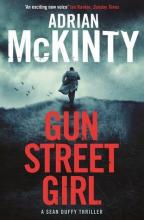Review - GUN STREET GIRL, Adrian McKinty
GUN STREET GIRL is the fourth book to feature Irish cop Sean Duffy. The Duffy series, has been winning plaudits, praise and awards in all corners of the world and hugely deserved they have all been, which meant fans of both the writer and the earlier three books (THE COLD, COLD GROUND, I HEAR THE SIRENS IN THE STREET and IN THE MORNING I'LL BE GONE) were well pleased when the fourth book was announced. Now all we need is more of these and we'll stay happy. (No pressure or anything of course).
Of most interest to this reader was how a fourth book would slot into what had originally been planned, and seemingly executed as a trilogy. Whilst there were storylines that could be extended at the end of IN THE MORNING I'LL BE GONE, there was much that had been explored, prodded, drawn out, and tied off. It was more than gratifying to find much in GUN STREET GIRL that raises the standards of the 3 earlier books even more.
A lot of that is helped by the glorious, understated dry dialogue, observation and writing of this author. There's no padding, no overstatement and none of your shilly shallying about in here. At the same time it's wonderfully descriptive, frequently hilarious, and absolutely skewering.
"But I'm not in charge and that is not what happens. This being an RUC-Gardai-FBI-MI5-Interpol operation we are headed for debacle ... "
"'Farce isn't my cup of tea,' I tell him, wind the window up and pull out of the car park. The me in the rear-view mirror shakes his head. That was a silly remark. Far out here, on the edge of the dying British Empire, farce is the only mode of narrative discourse that makes any sense at all."
Given that the action centres around Belfast in the mid 1980's, during the Troubles and the time of Thatcher's British Government, the social observations and the insider view of policy decisions like the Anglo-Irish Agreement (of 1985 - not to be confused with the Treaty of 1921 or the Trade Agreement in the 1960's...) are as much a factor in what makes these books work as are the strong characters, and the even stronger sense of place.
"'Here the politics are centrifugal, not centrist. Extreme Nationalists and extreme Unionists will condemn the Agreement as a sell-out of their principles and the moderates in the middle who support it will look like fools.'"
Balanced elegantly against that backdrop is a real, and intriguing plot. The murder of a very wealthy couple and the suicide of their son is soon revealed to be something much bigger than the easy solution of murder-suicide. And it is Duffy's copper instincts that tell him something's not right. And it is his copper instincts that keep them digging even when things start to get very grown up and very weird. The lurking presence of the intelligence bods - US and UK, and the possibility of career moves for Duffy all contribute to a bigger picture which gets more and more complicated the deeper Duffy and his colleagues dig.
At the heart of these books, however, is Sean Duffy. He's not perfect, he's not above a bit of pilfering of drug seizures, he's not above the occasional joint or line, and he's certainly not lucky at love. He's determined to stay a Catholic man in the centre of a Protestant area, even when that sometimes means he's got to have a deep and meaningful with the neighbours who keep the tensions at bay. He tries to play fair with everyone he deals with, and he's a very very good cop. He's also in a no-win position in his job. Trapped at his current level, constantly viewed with suspicion by the higher-ups he is absolutely loyal to his team and very supportive, albeit in a slightly haphazard manner at times. It's impossible not to read his stories and not think he deserves more. A happy home life, a job where he's appreciated, people around him who aren't constantly trying to get at him. At the same time you kind of hope that some of that doesn't happen. A happy, contented, comfortable Sean Duffy may not be quite the edgy copper he is right now. Either way, let's hope that GUN STREET GIRL has broken the back of McKinty's trilogy habit and there's a lot more in this series to come.
Belfast, 1985, amidst the “Troubles”: Detective Sean Duffy, a Catholic cop in the Protestant RUC (Royal Ulster Constabulary), struggles with burn-out as he investigates a brutal double murder and suicide. Did Michael Kelly really shoot his parents at point blank and then jump off a nearby cliff? A suicide note points to this conclusion, but Duffy suspects even more sinister circumstances. He soon discovers that Kelly was present at a decadent Oxford party where a cabinet minister’s daughter died of a heroin overdose. This may or may not have something to do with Kelly’s subsequent death.
New evidence leads elsewhere: gun runners, arms dealers, the British government, and a rogue American agent with a fake identity. Duffy thinks he’s getting somewhere when agents from MI5 show up at his doorstep and try to recruit him, thus taking him off the investigation.
Duffy is in it up to his neck, doggedly pursuing a case that may finally prove his undoing.
| Review | Review - GUN STREET GIRL, Adrian McKinty | Karen Chisholm
|
Thursday, February 5, 2015 |
| Blog | Currently Reading - GUN STREET GIRL, Adrian McKinty | Karen Chisholm
|
Saturday, January 17, 2015 |

